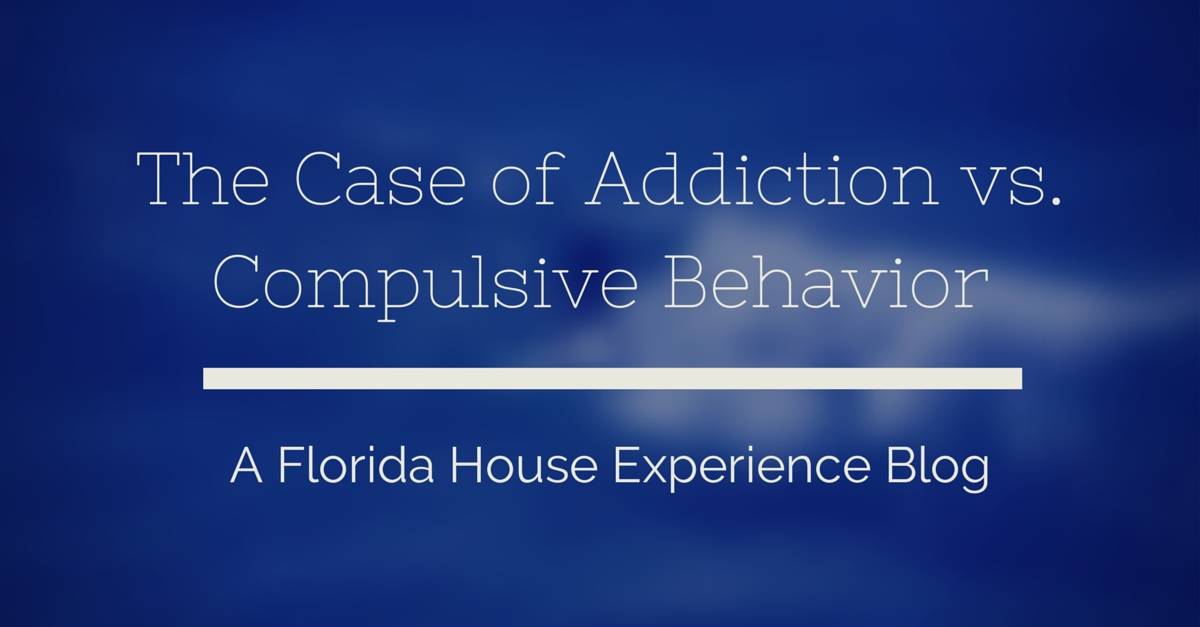
The word “addiction” gets thrown around a lot these days—anything from sex to eating dirt—but what’s the difference between an actual addiction and a compulsive behavior?
The Difference Defined
By definition, a compulsion is a behavior that occurs in response to an obsessive thought that will only be relieved by engaging in the behavior. Therefore; when the obsessive thought returns, as thoughts do, there is a perceived need to act on it, and the compulsion occurs. This stops the obsessive thought temporarily. An addiction is due to a brain chemical (dopamine), and is acted upon to elicit a desired heightened state of elation.
According to the American Society of Addiction Medicine (ASAM), the “Short Definition of an Addiction” is a primary, chronic disease of brain reward, motivation, memory and related circuitry. Dysfunction in these circuits leads to characteristic biological, psychological, social and spiritual manifestations. This is reflected in an individual pathologically pursuing reward and/or relief by substance use and other behaviors.
Addiction or Compulsive Behavior?
1. Eating Dirt
We did it as kids, but there are some people who will continue on the dirt eating road well into their adulthood. Pica, as it is known, can be treated. There is no reward in eating dirt though, making this one a compulsive behavior.
2. Sex
We do a lot of things on a daily basis, and we are not addicted to those things. The same could be said for those who claim to be addicted to sex. Sex is a natural activity, same as sleep or drinking water, that activates the same brain stimulants as truly addictive substances, but if it was to be truly and medically classified as an addiction, then it could protect many from criminal prosecution—think rapists or pedophiles. This one is a compulsive behavior.
3. Funerals
Yeah what? This one is weird and it doesn’t have a name. People are just going with “funeral addiction,” as of right now. There is little reward for attending funerals, seeing other people’s sadness, misery or celebrating the life of someone you probably didn’t know. This one? It is a compulsive behavior
4. Tattoos
There are only so many tattoos the body can have well, on its body. Even if you tattooed the inside of your mouth you would eventually run out of room. Those who choose to get tattoos in the name or art or as a commitment to a cause are fine but getting tattooed does give off high levels of endorphins that can lead to more emotional ties with the memory of the tattoo. This one? It is an addiction.
5. Being Really Clean
There are various different forms of cleanliness. Some conditions are linked to contamination obsession; others are categorized as an obsession with cleaning. There is a reward believe it or not and obvious evidence of an individual pathologically pursuing reward and or relief by substance use and other behaviors. It’s an addiction.
6. Cosmetic Surgery
This is similar to tattooing in a sense. There is clear evidence to suggest the behavior is linked to negative body image, which in extreme cases is linked to body dysmorphic disorder. It is an addiction.
7. Hoarding
We have all seen the show Hoarders. Hoarding can be done by accumulating a variety of seemingly useless stuff. Whatever is being collected and not thrown out is not the result of any reward though, as the motivation for hoarding usually stems from an anomaly in the brain or past experience. It is a behavior.
8. Tanning
UV rays can speed up endorphins that could affect and feed a tanning addiction. However tanning can also be about appearance. The value of a tan depends greatly on where you are from as well. This one? It’s a compulsive behavior.
9. Social Media and the Internet
If you cut off a nicotine addict’s access to cigs, the result would be a chemical imbalance inside their body, resulting in withdrawal. If the World Wide Web suddenly stopped working there would be a lot of anger and frustration but no withdrawal. This is a behavior.
10. Gambling
There is an obvious reward in gambling. And much like an addict chases their first high, a gambler will chase their first win. Gambling could be considered an addiction when it affects your every day life, your bank account or your livelihood. This one? It is an addiction.
11. Exercise
Compulsively exercising such as repeated the same routine despite illness ,injury or outside commitments, can be an addiction. The release of endorphins into the system can be one of the many reasons for it as well as the desire to look good. This one? It’s an addiction.
12. Ice Chewing
It is known as pagophagia, it affects about two percent of American males ages 18 and older as well as 16 percent of females between ages 16 and 19. The reasons are varied, a nervous habit maybe, or the love for the noise and crunch of ice, or maybe more so, an iron deficiency. This one? It is an addiction.
13. Shopping
Scientifically known as oniomania, it is either a good excuse or an actual problem. It affects 8% of Americans with more women afflicted than men. Studies have shown that low levels of serotonin, which is often linked to depression, are the major factors in its onset. If the demand for shopping outweighed by the money available, then this could well be determined as an addiction. But! It is a compulsive behavior.
14. Celebrity
Yep. This is more common than it was 40 years ago due to the increased coverage of celebrities. There are some instances of borderline pathological obsessions, which come in the form of celebrity worship, including copying a celebrity’s life, appearance and straight up emotional attachment. The most serious cases include criminal activity. But there is no evidence to suggest you can genuinely become addicted to a person. It is a compulsive behavior.






